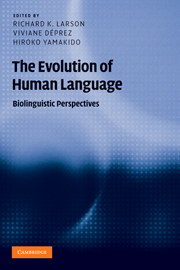Book contents
- Frontmatter
- Contents
- Figures
- Contributors
- Acknowledgments
- Introduction
- 1 The faculty of language: what is it, who has it, and how did it evolve?
- Part I Language architecture
- 2 Some simple evo devo theses: how true might they be for language?
- 3 Your theory of language evolution depends on your theory of language
- 4 Three meanings of “recursion”: key distinctions for biolinguistics
- 5 On obfuscation, obscurantism, and opacity: evolving conceptions of the faculty of language
- Part II Language and interface systems
- Part III Biological and neurological foundations
- Part IV Anthropological context
- Notes
- References
- Index
5 - On obfuscation, obscurantism, and opacity: evolving conceptions of the faculty of language
Published online by Cambridge University Press: 05 June 2012
- Frontmatter
- Contents
- Figures
- Contributors
- Acknowledgments
- Introduction
- 1 The faculty of language: what is it, who has it, and how did it evolve?
- Part I Language architecture
- 2 Some simple evo devo theses: how true might they be for language?
- 3 Your theory of language evolution depends on your theory of language
- 4 Three meanings of “recursion”: key distinctions for biolinguistics
- 5 On obfuscation, obscurantism, and opacity: evolving conceptions of the faculty of language
- Part II Language and interface systems
- Part III Biological and neurological foundations
- Part IV Anthropological context
- Notes
- References
- Index
Summary
Let me start out with an experience that I assume is relatively familiar. You have just landed in a foreign country, speak only the most minimalist version of the local language, and try to get by, generating telegraphic utterances about toilets, banks, and places to eat. Largely, you feel deeply misunderstood and frustrated, but occasionally enjoy the novelty of your experiences, including the people you meet along the way and the attention you sometimes receive. The response to my paper on the evolution of the language faculty with Chomsky and Fitch (2002) has left me in a similar state. Sometimes I think, based on the confusion surrounding our paper, that we must have been speaking an utterly foreign language. At other times, paraphrasing one of my favorite Dawkins-isms, I think there is a wanton eagerness to misunderstand, misconstrue, or fabricate. Sometimes I yield to a more charitable view and assume that we failed to make our position clear because of a telegraphic attempt to articulate a complicated set of arguments and proposals for both the prior history of work on this topic as well as potentially fruitful directions for the future. And sometimes I think that the state of play in the study of language evolution is doomed to endless obfuscation, obscurantism, and opacity!
- Type
- Chapter
- Information
- The Evolution of Human LanguageBiolinguistic Perspectives, pp. 91 - 100Publisher: Cambridge University PressPrint publication year: 2010
- 2
- Cited by



